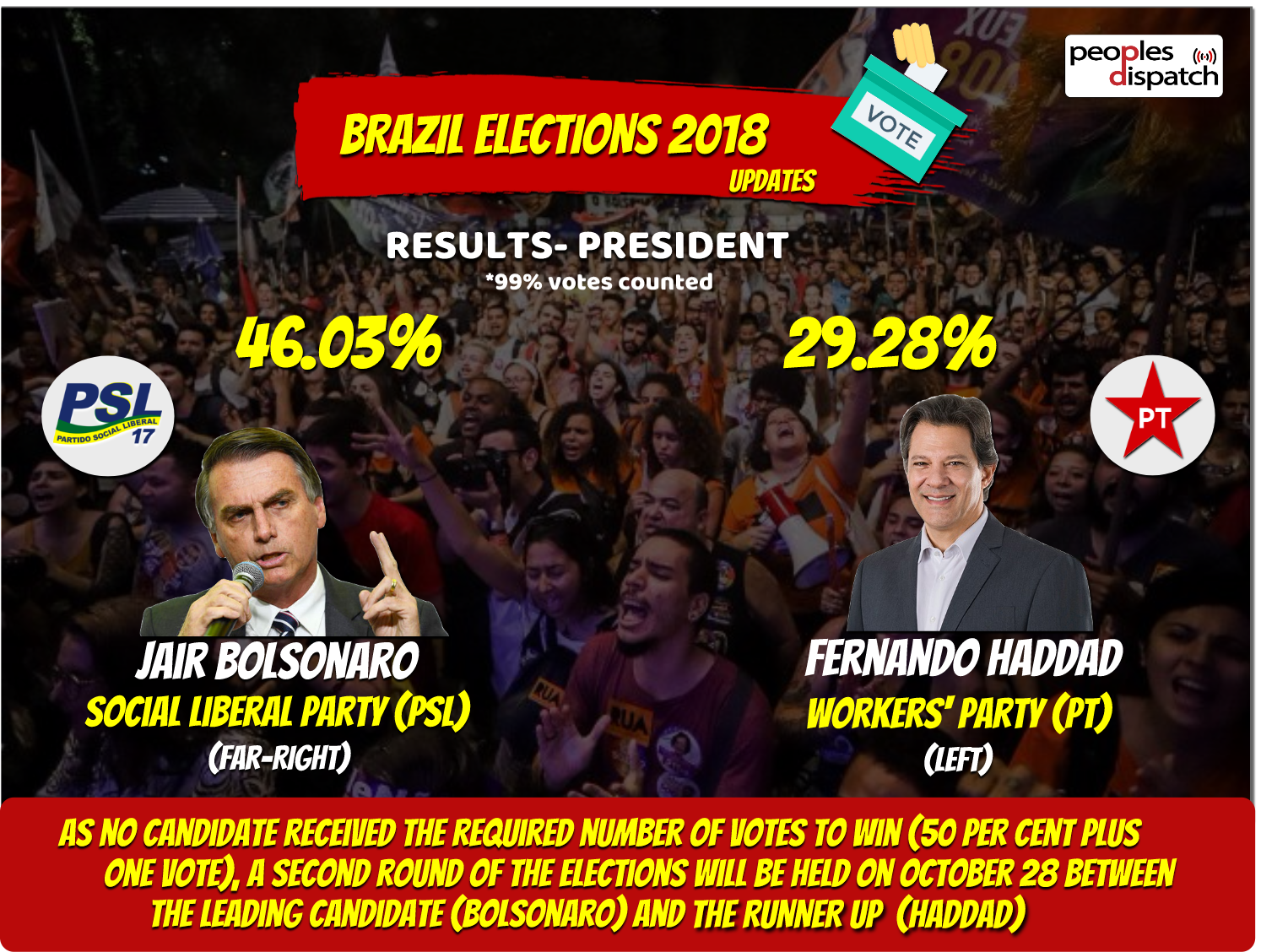The first round of the Brazilian presidential election led to some nail-biting moments for progressive, leftist and liberal voters in the country as extreme right-wing candidate Jair Bolsonaro, at one point of time, seemed very close to victory. However, in the end, Bolsonaro was not able to cross the 50% vote margin needed to win outright. A second round of voting will be held on October 28 when he will face Fernando Haddad of the Workers’ Party (PT). With over 99% of the votes counted, Bolsonaro had bagged 46.03% of the votes and Haddad 29.28%. Ciro Gomes of the Democratic Labor Party won 12.5% of the vote.
Speaking after the results, Haddad talked about the importance of the coming second round. “Let us defend Brazil and its people, especially the poorest people. I have always been on the side of freedom and democracy. I will not give up my values,” he said. He added that he had already spoken to some of the other candidates, Ciro Gomes, Guilherme Boulos and Marina Silva, and called for keeping the door open for dialogue. He nonetheless added that the second round gave the opportunity to directly take on the extreme right through debate and argument.
The battle lines are being set for the next round. Guilherme Boulos, who contested on the Socialism and Liberty Party ticket, declared his support for Fernando Haddad while Gomes has declared he would not support Bolsonaro. Bolsonaro has been widely criticized for his racist, homophobic and misogynist comments, and has unabashedly celebrated the Brazilian military dictatorship (1964-1985) which was responsible for the deaths of thousands. On two occasions in the last 10 days, thousands of women took to the streets protesting his comments as part of the #EleNao (Not him) campaign.
Results from the gubernatorial elections were also announced. While 13 provinces saw outright victors in the first round, another 14 will go for a second round of polls on October 28. PT candidates were elected as governors in the provinces of Bahia, Ceara and Piaui.
While the PT emerged as the largest party in the chamber of deputies with 55 seats and nearly 11% of the vote, it did not fare too well in the senate elections, winning only six seats. The MDB of president Michel Temer emerged the largest party in the Senate with 11 seats. Results of 505 of the 513 lower house seats and 79 of the 81 senate seats have been announced so far. Former president Dilma Rouseff of the PT was among the candidates who failed to make it to the senate.
Abstention rates rose considerably with nearly 20% of the eligible 147 million voters not casting their vote according to official sources and 39% staying away, according to the Brazilian media agency GloboNews, Telesur reported. Voting is mandatory in Brazil.
Analysts and scholars expressed serious concern over the possibility of a Bolsonaro victory in the second round and its implications for the social and political situation in Brazil. Speaking to Radio BdF, Leidiano Farias, a historian and member of the People’s Brazil Front, said,“What is at stake this Sunday, and possibly the runoff vote [on Oct. 28], is whether we will restore democracy and national sovereignty or recognize the legitimacy of the [2016] coup on the ballot. The election is happening in a moment when the country is under a coup d’état. A win for a candidate like Jair Bolsonaro will only legitimize this coup. It will legitimize the neoliberal reforms, such as the Labor Refor, which represents a setback against what workers have achieved throughout history.”
“ When Dilma Rousseff was elected in 2014, a group was created to take her down. The anti-Workers Party sentiment was created..[there was] hate and the manipulation of anti-corruption discourse. The extreme-right was empowered by this climate of hate that went out of control from the traditional parties,” Breno Altman journalist and founder of OperaMundi, told Radio BdF.





